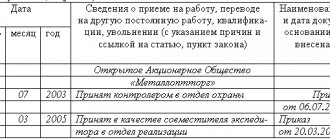When can the term of an employment relationship be established by agreement of the parties?
In cases provided for in Part 2 of Art. 59 of the Labor Code of the Russian Federation, a fixed-term employment contract can be concluded by agreement of the parties without taking into account the nature of the work to be performed and the conditions for its implementation:
1. With persons entering work for employers - small businesses (including individual entrepreneurs), the number of employees of which does not exceed 35 (in the field of retail trade and consumer services - 20). Let us recall that the criteria for classifying organizations as small businesses are determined by Federal Law dated July 24, 2007 N 209-FZ “On the development of small and medium-sized businesses.”
2. With age pensioners entering work, as well as with persons who, for health reasons in accordance with a medical certificate issued in the manner established by federal laws and other regulatory legal acts of the Russian Federation, are allowed to work exclusively of a temporary nature. Many employers, when their employees reach retirement age, renew employment contracts with them, setting a term in them. This is mistake. This rule requires that the term of the employment relationship be established by agreement between the employer and the pensioner only upon hiring.
Note!
List of grounds for concluding a fixed-term employment contract, established by Art.
59 of the Labor Code of the Russian Federation, is exhaustive (Letter of Rostrud dated December 18, 2008 N 6963-TZ). If the court, when resolving a dispute about the legality of concluding a fixed-term employment contract, determines that it was concluded by the employee involuntarily, it will apply the same rules as to a contract concluded for an indefinite period. 3. With persons entering work in organizations located in the Far North and equivalent areas, if this is associated with moving to the place of work. The list of such regions and localities was approved by Resolution of the USSR Council of Ministers of November 10, 1967 N 1029. We note that with citizens permanently residing in the regions of the Far North and equivalent areas, a fixed-term agreement cannot be concluded on this basis.
4. To carry out urgent work to prevent disasters, accidents, accidents, epidemics, epizootics, as well as to eliminate the consequences of these and other emergency circumstances (for example, flood or fire).
5. With persons elected through a competition to fill the relevant position, conducted in the manner established by labor legislation and other regulatory legal acts containing labor law norms. For example, in accordance with Art. 332 of the Labor Code of the Russian Federation, the conclusion of an employment contract to fill the position of a scientific and pedagogical worker in a higher educational institution is preceded by election through a competition to fill this position. A competition is also provided for admission to various types of services - municipal, state civil, in internal affairs bodies, etc.
6. With creative workers of the media, cinematography organizations, theaters, theatrical and concert organizations, circuses and other persons involved in the creation and (or) performance (exhibition) of works. The list of jobs, professions, and positions of these workers was approved by Decree of the Government of the Russian Federation of April 28, 2007 N 252.
7. With managers, deputy managers and chief accountants of organizations, regardless of their legal forms and forms of ownership. Article 275 of the Labor Code of the Russian Federation regulates the procedure for determining the term of an employment contract with the head of an organization: it is determined by the constituent documents of the organization or by agreement of the parties.
8. With persons studying full-time.
9. With crew members of sea vessels, inland navigation vessels and mixed (river-sea) navigation vessels registered in the Russian International Register of Ships.
10. With persons applying for part-time work. Let us remind you that, by virtue of Art. 282 of the Labor Code of the Russian Federation, part-time work is understood as the performance by an employee of other regular paid work under the terms of an employment contract in his free time from his main job. The duration of working hours when working part-time should not exceed four hours a day (Article 284 of the Labor Code of the Russian Federation).
11. In other cases provided for by the Labor Code of the Russian Federation or other federal laws (for example, with foreign workers).
Note.
If it is established during the trial that there have been multiple conclusions of fixed-term employment contracts for a short period of time to perform the same labor function, the court has the right, taking into account the circumstances of each case, to recognize the employment contract as concluded for an indefinite period (clause 14 of Resolution No. 2).
In what cases is it possible, but not necessary, to register an employee under the STD?
An optional STD is called “by agreement of the parties.”
An employer may enter into it with persons under the following circumstances:
- Small businesses with a staff of no more than thirty-five people;
- An employee of retirement age, and also if, according to a doctor’s prescription, he can only be in temporary work;
- Working in the Far North requires moving there;
- To eliminate the consequences of disasters, epidemics, accidents, as well as to prevent these events;
- People of creative professions (filmmakers, media journalists, theater and circus artists);
- Full-time employee of an educational institution;
- Crew members of sea and river vessels;
- Managers, their deputies and chief accountants of enterprises, regardless of the form of ownership and activity of the company;
- Part-timers;
- Deputy positions of scientific and pedagogical staff in a higher educational institution;
- Persons invited to a coaching position to prepare students for competitions.
In all other cases (their overwhelming majority), the law prescribes the hiring of workers only under an open-ended employment contract.
Features of a fixed-term employment contract
A fixed-term employment contract is concluded according to the general rules established by Ch. 11 of the Labor Code of the Russian Federation: the employee is requested to provide the necessary information in accordance with Art. 65 of the Labor Code of the Russian Federation, documents are checked for the absence of medical contraindications to the work, then the contract itself is drawn up in writing in two copies. One copy is given to the employee, the other is kept by the employer. Receipt of a copy of the employment contract by the employee must be confirmed by his signature on the copy kept by the employer.
Let us dwell in more detail on some of the conditions that should be formulated in a fixed-term employment contract.
The first step is to correctly formulate the reason for establishing a fixed-term employment relationship. Let us remember that this is required by Art. 57 Labor Code of the Russian Federation. One indication that an employment contract is fixed-term is not enough: if the reasons that required the conclusion of an employment contract of this nature are not explained, it can be reclassified as an employment contract concluded for an indefinite period.
When formulating the term of the employment contract, it is best to indicate the exact dates of the beginning and termination of the employment relationship. This immediately gives the employee an idea of the expected date of dismissal and helps to avoid disputes when terminating the contract. However, in some cases the expiration date of the contract is difficult to determine. For example, an employee goes on maternity or child care leave. By virtue of Art. 256 of the Labor Code of the Russian Federation, during the period of parental leave, the employee retains his place of work (position). At the same time, the legislator allowed the use of such leave in full or in part, which means that the employee can leave the leave on any day she wishes. Therefore, the employer cannot specify a specific expiration date for the employment contract with the person hired to perform the duties of an employee on maternity leave. In this case, the start date of the employment relationship is clearly defined, but the end of the employment contract will be associated with a specific event - the employee’s return from vacation.
Note.
When drawing up a fixed-term employment contract for temporary work, you can specify not the position for which the employee is hired, but the specific type of work assigned.
It is necessary to indicate the start date of the work, the date (event) of its completion and the reasons for its urgent nature (for example, “during the completion of work to clean up the territory”). The wording of the basis for concluding a fixed-term employment contract in this case may be as follows: “This employment contract was concluded in accordance with Part 1 of Art. 59 of the Labor Code of the Russian Federation for the duration of the duties of Anna Ivanovna Ivanova, who is on maternity leave until she reaches the age of three years.”
The Plenum of the Armed Forces of the Russian Federation in Resolution No. 2 indicated: when concluding a fixed-term employment contract for local government, they cannot be accepted for a period longer than the term of election.
Fixed-term and unlimited-term contracts - what is the difference?
For ease of comparison, we present the data in table form:
| Index | Perpetual TD | Urgent TD |
| Validity | Has no expiration date | Maximum five years. The deadline can be indicated by a date or event (the departure of a permanent employee, the end of temporary work). In addition, it is added to the order |
| Reason for imprisonment | Not specified | Must be specified in the order |
| Worker task | The employer constantly assigns new tasks | The task is one-time and specific |
| Employee social guarantees | Provided for by the Labor Code (sick leave, vacation, etc.) | Similar to BTD, if at the time of the warranty period the STD has not yet expired |
| State attitude | It is perceived as a guarantee of stable income for the population and economic prosperity | A possible source of risk in the form of abuse by the employer. Maximum inspections by the Labor Inspectorate |
However, the employer cannot always freely choose what type of contract to offer the applicant, since in some points the law requires the conclusion of a STD, and in others it makes such a step on the part of the employer possible, but not mandatory.
Test for fixed-term employment relationships
Another important point is the establishment of the test. In a fixed-term employment contract, as in an open-ended one, by agreement of the parties, a condition may be provided for testing the employee in order to verify his compliance with the assigned work (Article 70 of the Labor Code of the Russian Federation). But not everyone with whom a fixed-term employment contract is concluded can have a probationary period. Thus, an admission test is not established for persons:
- those elected to an elective position for paid work;
— concluding an employment contract for a period of up to two months.
When concluding a contract, check whether the employee being hired falls into these categories.
The probationary period cannot exceed three months, and for heads of organizations and their deputies, chief accountants and their deputies, heads of branches, representative offices or other separate structural divisions of organizations - six months, unless otherwise established by federal law.
When concluding an employment contract for a period of two to six months, the probationary period cannot exceed two weeks.
Grounds for registration by agreement of the parties
- Employment of a pensioner.
- An employee can only work temporarily due to health problems.
- The employer is engaged in a small business and his staff is small: up to 35 (in some cases up to 20) people.
- The employing company is located in the Far North.
- The employee received the position through a competition.
- Elimination of consequences of accidents.
- The worker's profession is creative. For example, an actor while filming a movie.
- Concluding a contract with a manager, deputy, chief accountant (you can learn more about the conditions and procedure for concluding a fixed-term employment contract, as well as see a sample document here).
- Employment of a full-time student.
- Part-time employment.
- Other cases.
Is it possible to change the term of the contract?
Some provisions of the Labor Code directly provide for the possibility of extending the term of an employment contract. For example, in accordance with Art. 332 when a university employee is elected through a competition to fill the position of a scientific and pedagogical worker previously occupied by him under a fixed-term employment contract, a new employment contract may not be concluded: the validity of a fixed-term employment contract is extended by agreement of the parties, concluded in writing, for a certain period of not more than five years or For undefined period.
It is also possible to extend the term of the employment contract during the employee’s pregnancy. If a fixed-term employment contract expires during a woman’s pregnancy, the employer is obliged, upon her written application and upon provision of a medical certificate confirming the state of pregnancy, to extend the term of the employment contract until the end of pregnancy (Article 261 of the Labor Code of the Russian Federation). A woman whose employment contract has been extended until the end of her pregnancy is obliged, at the request of the employer (but not more than once every three months), to provide a medical certificate confirming the state of pregnancy. If, in this case, the woman actually continues to work after the end of pregnancy, then the employer has the right to terminate the employment contract with her due to its expiration within a week from the day on which she learned or should have learned about the end of the pregnancy.
Note!
It is permissible to dismiss a woman due to the expiration of an employment contract during her pregnancy, if the employment contract was concluded for the duration of the duties of an absent employee and it is impossible, with the written consent of the woman, to transfer her to another job available to the employer before the end of her pregnancy (as a vacant position or a job corresponding to the woman’s qualifications, as well as a vacant lower-level position or lower-paid work), which a woman can perform taking into account her state of health (Article 261 of the Labor Code of the Russian Federation).
Athletes were also not spared: the extension of the employment contract with them was regulated. Let me explain. If the employer cannot ensure the participation of the athlete in competitions, by agreement between the employers, a temporary transfer of the athlete with his written consent to another employer for a period of no more than a year is allowed. A fixed-term employment contract is also concluded for this period. If the athlete continues to work at the place of temporary work after the end of the temporary transfer, then the employment contract concluded with him for the period of transfer may be extended by agreement of the parties or for an indefinite period (in the absence of an agreement on the period), and the initially concluded employment contract ceases to be valid ( Article 348.4 of the Labor Code of the Russian Federation).
Some articles of the Labor Code establish the possibility of extending tenure in a certain position, but it does not say how to formalize this decision. For example, the rector has the right to extend the tenure of the vice-rector, the head of the branch (institute) until they reach the age of 70 years (Part 13 of Article 332 of the Labor Code of the Russian Federation). The legislator did not specify which document to draw up for this - an additional agreement to extend the term of office or a new fixed-term employment contract.
Note!
When transforming a fixed-term employment contract into an open-ended one, it is not necessary to make any entry in the work book (Letter of Rostrud dated November 20, 2006 N 1904-6-1).
In other cases not directly provided for by labor legislation, the term of the employment contract may also be extended. The Labor Code provides for the possibility of amending an employment contract, regardless of whether it is fixed-term or indefinite. The term of the contract, like any other condition, can be changed by agreement of the parties. This point of view was also supported by Rostrud in Letter dated October 31, 2007 N 4413-6.
Guarantees under the contract
A temporary worker has the same rights and social guarantees that are provided to those with whom a permanent contract is concluded.
Moreover, an employee whose contract term is no more than two months is prohibited from establishing a probationary period.
If, after the expiration of the TD term, neither party initiated its termination, it automatically becomes permanent.
Entry in the work book
The work book of an employee hired under a fixed-term employment contract is filled out according to the general rules. Based on Art. 66 of the Labor Code of the Russian Federation, the employer is obliged to keep a work book for everyone who has worked for him for more than five days, if this place of work is the main place of work for the employee. An entry for employment is made on the basis of the relevant order (instruction) no later than a week from the date of its publication (clause 10 of the Rules for maintaining and storing work books).
There is no need to make an entry in the employment record indicating the term of the contract. This is a direct violation of the Instructions for filling out work books, approved by Decree of the Ministry of Labor of the Russian Federation dated October 10, 2003 N 69. If such a violation does occur, it is necessary to make changes to the book - invalidate the incorrect entry and make a new, correct entry about admission (clause 1.2 of the said instructions).
Hiring procedure
The procedure for hiring for a fixed term is similar to the procedure for hiring under an open-ended employment contract, with the exception of some nuances.
When is it concluded?
The list of conditions for concluding a TD is given in Article 59 of the Labor Code of the Russian Federation. All conditions are divided into two groups:
- Conditions, if any, that do not require the employee’s consent.
- Conditions under which the conclusion of a fixed-term contract is possible only by agreement of the parties.
The first group includes the following conditions:
- performing temporary or seasonal work, as well as employment in a workplace originally created for a certain period;
- replacing a temporarily absent employee;
- performing alternative service;
- work abroad;
- election to an elected temporary position.
The second group includes agreements with:
- manager or chief accountant;
- an old-age pensioner;
- part-time worker;
- employees of enterprises classified as small businesses.
It is possible to conclude an employment contract for a certain period only on the grounds given in the legislation, since this list is complete and is not subject to expanded interpretation.
The maximum period for which a fixed-term employment contract can be concluded is 5 years.
How is it?
When concluding such an agreement, information is entered into it that the contract is concluded for a certain period, the start and end dates of the work are indicated, as well as the reason that served as the basis.







